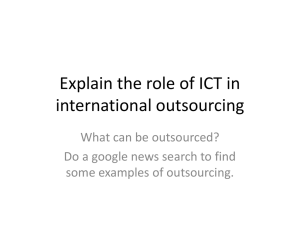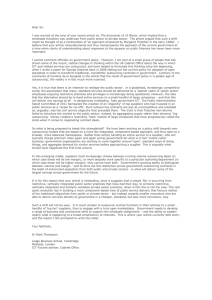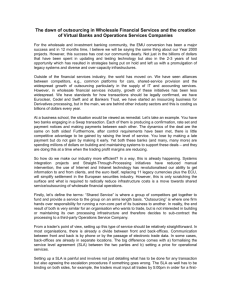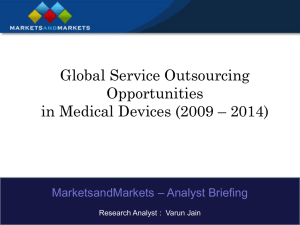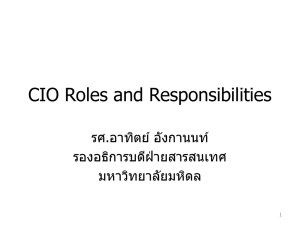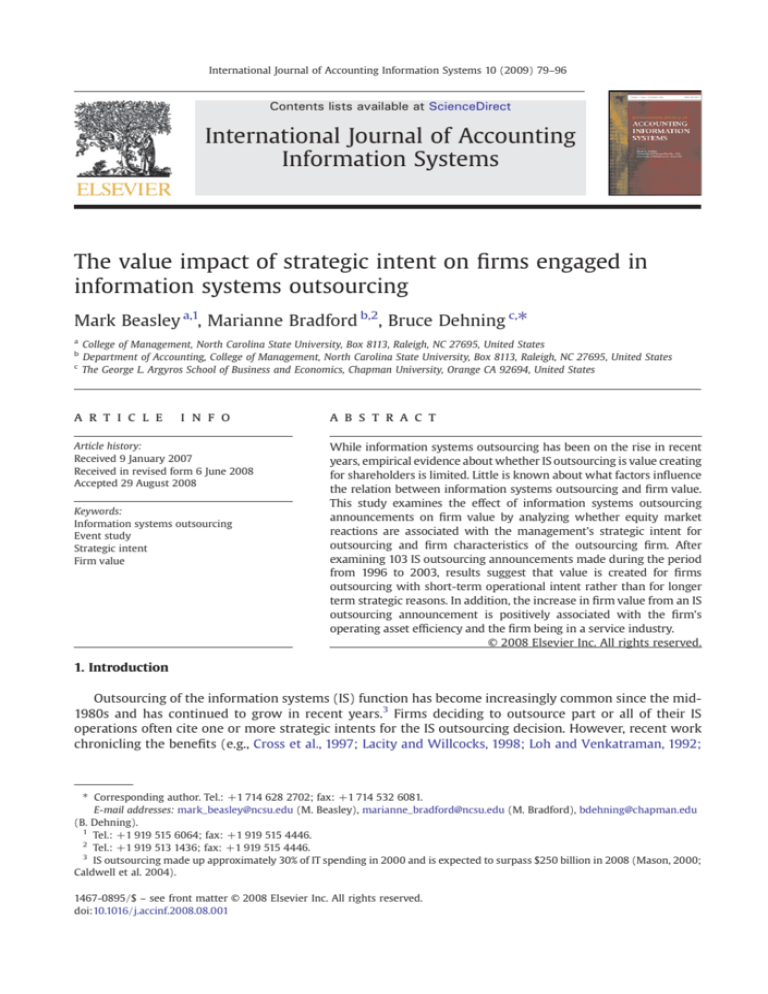
International Journal of Accounting Information Systems 10 (2009) 79–96
Contents lists available at ScienceDirect
International Journal of Accounting
Information Systems
The value impact of strategic intent on firms engaged in
information systems outsourcing
Mark Beasley a,1, Marianne Bradford b,2, Bruce Dehning c,⁎
a
b
c
College of Management, North Carolina State University, Box 8113, Raleigh, NC 27695, United States
Department of Accounting, College of Management, North Carolina State University, Box 8113, Raleigh, NC 27695, United States
The George L. Argyros School of Business and Economics, Chapman University, Orange CA 92694, United States
a r t i c l e
i n f o
Article history:
Received 9 January 2007
Received in revised form 6 June 2008
Accepted 29 August 2008
Keywords:
Information systems outsourcing
Event study
Strategic intent
Firm value
a b s t r a c t
While information systems outsourcing has been on the rise in recent
years, empirical evidence about whether IS outsourcing is value creating
for shareholders is limited. Little is known about what factors influence
the relation between information systems outsourcing and firm value.
This study examines the effect of information systems outsourcing
announcements on firm value by analyzing whether equity market
reactions are associated with the management's strategic intent for
outsourcing and firm characteristics of the outsourcing firm. After
examining 103 IS outsourcing announcements made during the period
from 1996 to 2003, results suggest that value is created for firms
outsourcing with short-term operational intent rather than for longer
term strategic reasons. In addition, the increase in firm value from an IS
outsourcing announcement is positively associated with the firm's
operating asset efficiency and the firm being in a service industry.
© 2008 Elsevier Inc. All rights reserved.
1. Introduction
Outsourcing of the information systems (IS) function has become increasingly common since the mid1980s and has continued to grow in recent years.3 Firms deciding to outsource part or all of their IS
operations often cite one or more strategic intents for the IS outsourcing decision. However, recent work
chronicling the benefits (e.g., Cross et al., 1997; Lacity and Willcocks, 1998; Loh and Venkatraman, 1992;
⁎ Corresponding author. Tel.: +1 714 628 2702; fax: +1 714 532 6081.
E-mail addresses: mark_beasley@ncsu.edu (M. Beasley), marianne_bradford@ncsu.edu (M. Bradford), bdehning@chapman.edu
(B. Dehning).
1
Tel.: +1 919 515 6064; fax: +1 919 515 4446.
2
Tel.: +1 919 513 1436; fax: +1 919 515 4446.
3
IS outsourcing made up approximately 30% of IT spending in 2000 and is expected to surpass $250 billion in 2008 (Mason, 2000;
Caldwell et al. 2004).
1467-0895/$ – see front matter © 2008 Elsevier Inc. All rights reserved.
doi:10.1016/j.accinf.2008.08.001
80
M. Beasley et al. / International Journal of Accounting Information Systems 10 (2009) 79–96
Smith et al., 1998) and risks involved in IS outsourcing (Aubert et al., 2004; Earl, 1996; Oh et al., 2006)
suggest that there remains widespread uncertainty about the value-adding benefits of IS outsourcing.
Although conceptually the purported benefits such as cost reductions and improvements in system
quality, access to expertise, organizational flexibility, and ability to focus on core competencies are
appealing, they must be weighed against risks created by outsourcing arrangements such as vendor overopportunism, loss of control, increased governance costs, and technological inflexibility (Beasley et al.,
2004; Aubert et al., 1998). Therefore, the decision to outsource IS with the ultimate goal of impacting firm
value through increased profits is a strategic decision, which weighs various costs and benefits, made by the
managers of a firm. However, limited empirical evidence exists about whether management's strategic
intent regarding IS outsourcing actually achieves the intended goal of increasing firm value.
Because many of the benefits of IS outsourcing are both intangible and long-term oriented, but many of the
risks such as loss of control due to asset specificity (Lonsdale, 2001) and technological lock-in (Aubert et al.,
2004) are near-term, there is a timing mismatch between risks and potential benefits. This study attempts to
look at this mismatch by examining management's strategic intent for IS outsourcing in face of the known and
unknown risks.
The event study methodology has been used frequently in recent years to explore the relationship between IT
investments and firm performance (e.g., Dewan and Ren, 2007; Ranganathan and Brown, 2006; Dehning et al.,
2003; Hunter, 2003; Chatterjee et al., 2002). The event study methodology is particularly appropriate in the IS
outsourcing context because of its ability to capture market participants' perceptions of the future tangible and
intangible benefits of IS outsourcing in current stock prices changes around the announcement of the IS
outsourcing arrangement. This study uses the event study methodology to examine whether management's
strategic intent for IS outsourcing and certain firm-specific characteristics are associated with increases in the
market value of the outsourcing firm upon announcement.
In this study we also examine a previously under-researched area: the relationship between firm
characteristics and the value impact of IS outsourcing announcements. Previous research has found that mean
positive abnormal returns resulting from IS outsourcing announcements are higher for smaller firms (Hayes
et al., 2000) and firms in the services sector (Oh et al., 2006; Hayes et al., 2000). However, beyond firm size and
industry, little is known about the impact of other characteristics of IS outsourcing firms and whether certain
firm characteristics lead to a differential market response to IS outsourcing announcements.
Building on prior work and establishing a new metric, strategic intent, the specific research questions
we pose include: Does management's disclosed strategic intent for IS outsourcing impact the market's
perceived benefits of the outsourcing agreement? Do firm characteristics impact the market's perceived
benefits of the outsourcing agreement? Is there an interactive effect between management's intent and
firm characteristics that impacts the market's perceived benefits of the outsourcing agreement?
This study extends previous research in this field in three ways: establishing a new metric for measuring
management's strategic intent for IS outsourcing, examining management's overall strategic intent for IS
outsourcing and the impact that has on the market reaction to IS outsourcing decisions, and testing
whether firm specific characteristics affect the perceived value from IS outsourcing and whether these
characteristics interact with the strategic intent in deriving benefits from IS outsourcing.
Although IS outsourcing announcements often include public disclosures of management's strategic
intent, limited evidence exists as to whether the market reacts differently to these various public
statements. Oh et al. (2006) find some initial evidence that a firm's stated intent of cost reduction through
IS outsourcing is positively associated with market reactions to outsourcing announcements, suggesting
that shareholders value public assertions of IS outsourcing motivated by cost savings opportunities. Beyond
cost savings assertions, an empirical examination of the impact of other strategic intents is lacking. Thus,
we extend previous research by examining management's overall strategic intent for IS outsourcing and the
impact that has on the market reaction to IS outsourcing decisions.
Based on a sample of 103 IS outsourcing announcements during 1996–2003, the findings show that
two-day cumulative abnormal returns (CARs) decrease as management's strategic intent for IS outsourcing
changes from short-term operational benefits to mid-term tactical benefits to long-term strategic reasons.
This suggests that shareholders value short-term operational benefits such as cost-savings associated with
IS outsourcing, perhaps because the performance of such contracts can be more easily measured and
monitored relative to other intents (Oh et al., 2006), or they do not believe that other managerial intents for
outsourcing that are less likely to be realized in the short-term are credible.



